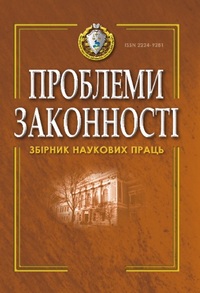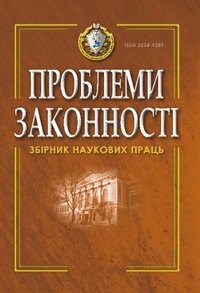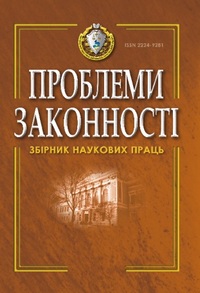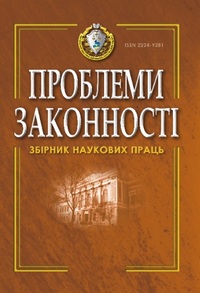Author(s): V. Alieksieichuk / Language(s): Ukrainian
Issue: 130/2015
Problem setting. Understanding of criminalistic methods exceeded now the boundaries of traditional points of view - as a methods of crimes investigation. An attention is drawn to the fact that the process of proof in criminal proceedings is not completed with a pre-court investigation, on the contrary, it is being continued even more actively during the court hearing. In this regard a need for providing of subjects of court hearings of criminal cases (judges, prosecuting attorneys, defense lawyers) with criminalistic methods is emphasized. At the same time the stated ideas have not been sufficiently developed in Ukrainian doctrine. Special papers devoted to particular criminalistic methods of court hearing of criminal cases are not present. This problem cannot be settled without preliminary solving of issues of more general theoretical meaning, especially, definition of essence and goals of particular criminalistic methods of court hearing in criminal proceedings. Recent research and publications analysis. Research of general-theoretical basic concepts of criminalistic methods was made by the domestic and foreign scientists (Yu. P. Alenin, O. Ya. Bayev, R. S. Byelkin, О. М. Vasylyev, І. О. Vozgrin, V. К. Gavlo, V. А. Zhuravel, А. V. Ishchenko, О. N. Kolesnichenko, V. V. Tishchenko, S. М. Churilov, А. V. Shmonin, B. V. Shchur, М. P. Yablokov and others). Issues of providing of criminalistic tools for court hearing in criminal proceedings are covered in the papers of the following scientists: L.Yu. Аrotsker, V. М. Bozrov, М. Y. Vilgushunsky, G. А. Vorobyov, V. К. Gavlo, S. L. Kyslenko, D. V. Kim, І. І. Kogutych, Yu. V. Korenevsky, О. Yu. Korchagin, S. P. Sukhov, О. О. Sychova, А. L. Tsypkin, Т. B. Chedzhemov, V. Yu. Shepitko and others. The authors of papers published in Ukraine in recent years, studying conceptual problems of providing with criminalistic methods of court proceeding in criminal process are: V.А. Zhuravel, І. І. Kogutych, І. І. Kotyuk, V. Т. Nor, B. V. Shchur. At the same time the scientists have not paid enough attention to the research of essence of particular criminalistic methods of court hearing of criminal cases and to the definition of its goals. Paper objective is an emphasizing and grounding of specific nature of goals of particular criminalistic methods of court hearing in criminal proceeding, definition of its essence. Paper main body. An essence of particular criminalistic methods of crimes investigation are scientific and practical guidelines which concern specific actions sequence, specific methods, techniques, ways and means of their implementation during investigation of a certain type (category) of a crime, intended for use in specific typical situations. The court hearing of criminal proceedings is actually a continuation of a process of learning an event which took place, it is of crucial importance, therefore it requires scientific and practical guidelines concerning its providing. The differences in the content of such guidelines are connected with diversity in some tasks of pre-court and court proceeding and goals of corresponding particular criminalistic methods concerning their providing. In this regard, definition of goals of particular criminalistic methods of court hearing in criminal proceeding should be based on an analysis of tasks of criminalistic methods in general as a section of criminalistics, goals of criminal proceedings and essence of proof. At the same time, goals of particular criminalistic methods (of investigation as well as of court hearing of criminal cases) have to disclose practical destination of the last one - as a system of guidelines developed for direct use in specific typical situations. The structure of such system of guidelines is determined by components of proof process which cover the following: collecting, recording, research, estimation аnd using of evidences. It should be taken into consideration that the stated elements are being implemented to different extents during pre-court investigation of a crime and during hearing of a case in court. So it is reasonable to make a preliminary analysis of particular criminalistic methods of a crime investigation, to determine differences in the conditions of implementing of the first and the second type of particular methods, as well as proportion between goals of court proceeding (court hearing) in criminal proceedings. Specific conditions of cognitive activity in the course of court hearing are: a) informational clearness and completeness of the evidences collected; b) larger degree of criminal event knowledge; c) larger distance in time from the criminal event; d) completeness of familiarity of the parties about the whole complex of the available evidences, their quality and thoroughness; e) extended scope of participants; f) availability of substantiated versions of parties; g) special (stressed) psychological atmosphere of activity; h) proneness to conflicts; i) restrictions in tactical means. Taken into consideration the stated differences in circumstances in which the court hearing takes place (in comparison with the crime investigation), and the aim and goals of court hearing, the proportion in tasks of relevant types of particular criminalistic methods can be followed. Conclusions of the research. The goals of particular criminalistic methods of court hearing in criminal proceedings are: 1) maintenance of activity of the representatives of criminal proceedings parties (prosecutor, defense lawyer) and of the court in the process of court hearing according to the particular types (categories) of crimes by the systems of scientific concepts and practical guidelines; 2) coordination of cognitive, constructive, communicative and organizational activities of corresponding subjects by providing typical actions programs regarding typical situations of court hearing; 3) contribution to an effective research, evaluation and correct interpretation of information provided by the parties and obtained during the court hearing; 4) providing of high-quality verifying of evidences (including identifying of disadvantages, mistakes, violations while collecting, their unreliability); 5) facilitating of analysis of the provided versions (prosecution and defense) and formulation (and checking) of court versions; 6) promoting of determination (proof) of guilt (or innocence) of an accused person and imposition of a fair and optimal penalty for a guilty person; 7) promoting of finding out the cause of changing situations of court investigation and taking them into account while using of typical actions programs. Particular criminalistic methods of court hearing in criminal proceeding can be defined as a system of scientific concepts and scientific and practical guidelines for maintenance of activity of the parties of criminal proceedings and the court during the court hearing according to the certain types (categories) of crimes aimed at research, checking and estimation of provided evidences, finding out the causes of differences in available information, determination (proof) of guilt (or innocence) of an accused person and imposition of a fair and optimal penalty for a guilty person. Definition of specific nature of particular criminalistic methods of court hearing of criminal cases is one of the arguments in grounding of need of their development as an individual complex of means of criminalistic tools and a step to creation of unified approaches in their formation.
More...




